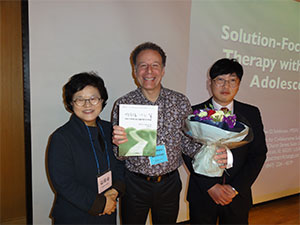
Working with Explosive and Violent Children and Adolescents:
A Collaborative Systemic Family Therapy Approach
Explosive and violent children and adolescents and their parents can be a nightmare to work with for even the most seasoned of therapists. Often these children and adolescents come from families characterized by difficulties with anger management, harsh parental discipline, rigidity, or a lack of structure and limits provided for them. Many of these children and adolescents use their rage and aggressive behaviors as a self-protective method for intimidating and distancing others, as well as armor to cover up their vulnerabilities and unresolved loss issues. In addition, these children and adolescents often attract many helping professionals from larger systems like a magnet.
In this “hands-on” practice-oriented workshop, a collaborative systemic family therapy approach will be presented that targets interventions at the child/adolescent, family, peer group, school, and larger systems levels. The ideas and treatment strategies presented in this workshop can be used in any treatment setting.
As a result of attending this workshop, participants will learn the following practical “how-to’s”:
- A collaborative systemic family therapy approach
- A multisystemic family assessment framework offering guidelines for where best to target therapeutic interventions
- Interviewing for possibilities: Therapeutic questions that elicit client expertise, untold family stories, and well-formed behavioral goals
- Effective engagement strategies with angry and explosive children and adolescents
- Angry and highly pessimistic parents: Effective research-based skill-building tools
- The Solution-Oriented Parenting Group
- Guidelines for constructing and selecting therapeutic experiments and rituals that fit family members’ unique stages of readiness to change, learning styles, and cooperative response patterns
- Taming self-defeating thoughts and emotional hijacks: Effective mood management and cognitive skill tools
- Riding the waves of change: Solution-enhancement and goal-maintenance strategies
- The use of peers and inspirational others as resources in treatment
- Untangling helping system knots: Facilitating transformative dialogues with involved helping professionals from larger systems
- Therapeutic dead-ends: Idea-generating strategies and trouble-shooting guidelines for getting unstuck

